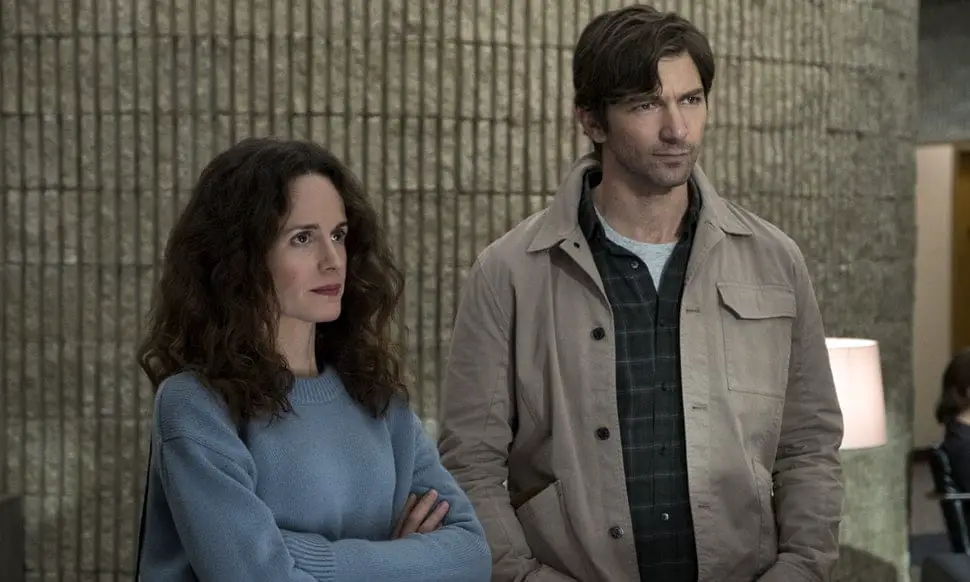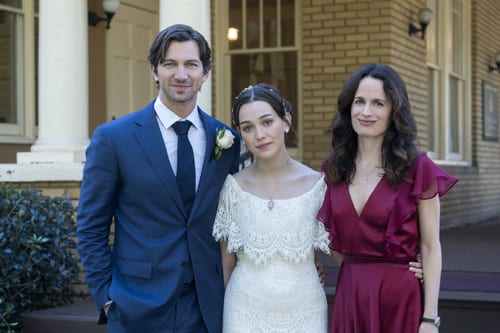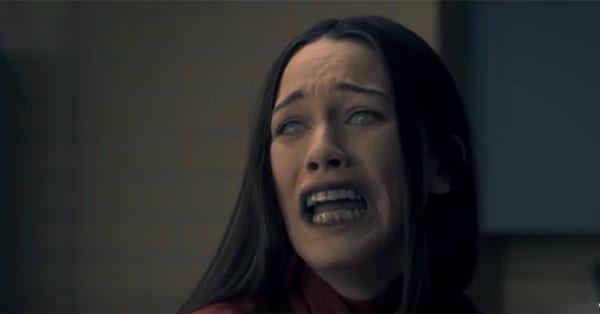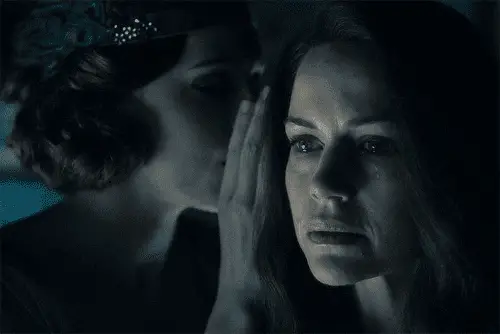Major SPOILERS for The Haunting of Hill House, both book and series
Friends, Romans, Countrymen…let’s talk about The Haunting of Hill House, Netflix’s new series (loosely) based on Shirley Jackson’s classic novel of the same name. Stephen King has praised it as “close to a work of genius.” Metacritic ranks it at 80%. IMDb users have rated it 9.1/10.
That’s pretty good, right? Pretty dang good! So why are we here? Just to sing the series’ praises?
Not…exactly. I liked it. I really did! I’m probably closer to Metacritic’s 80% than IMDb’s 9.1, and I’m not sure if it quite reaches the realm of “genius.” I’m a huge fan of the book, and while I don’t have problems with this “run through a different prism” version (as showrunner/creator Mike Flanagan has called it), I do have a few…quibbles. Issues. Problems.
So What’s This Thing About, Anyway?
The Haunting of Hill House is a 1959 novel by Shirley Jackson (“The Lottery,” We Have Always Lived in the Castle). Okay, so, something that might jump out right away is that this book was published in 1959, and the author was a woman. A woman writing genre-defining, groundbreaking horror in 1959. That’s a big deal, and it’ll be important later, so keep it in mind.
The original book (as well as the two subsequent movie versions, 1963 and 1999, both entitled The Haunting) follows Eleanor Vance (called “Nell”) as she participates in what she thinks is a study about people with insomnia. In truth Dr. John Montague is a paranormal researcher, and, as he reveals on their first night in the house, he’s invited several people to be part of his study, but only Nell and Theodora (“Theo”) have accepted. Also present is Luke Sanderson, the current heir to Hill House.
Nell has had poltergeist-like experiences from childhood, and Theo is possibly telepathic (and strongly coded as a lesbian or bisexual). Dr. Montague is studying whether people with past experiences with the paranormal are more “sensitive” to a so-called haunted house. Hill House fits the bill: its original owner, Hugh Crain, built the house for his wife and daughters, but the wife died in the driveway on her way to move in. His next two wives also died prematurely, and eventually the house was left to his daughters. The eldest kept the house, and lived there many years with the help of a village girl as a companion.
When “Old Miss Crain” died, the village girl had a decent claim on the house and sued the younger Crain sister to keep it. She won, but the younger sister bullied her until she committed suicide by hanging herself in the library.
I don’t want to cover the whole book here, but suffice it to say some seemingly paranormal stuff goes down, but there are questions about how much of it is really happening, and how much of it Nell is imagining or even causing. In the end she feels like Hill House belongs to her. The others are worried about the effect the house is having on her and insist she leave, but she rams her car into a tree so she can stay, presumably forever. It’s a bit ambiguous if she actually dies, though. It seems like she does, but the book ends the way it opens: whatever walks in Hill House, walks alone. So did it just prey on poor, vulnerable Nell, or is she now “what walks there”?
Changes, Changes…
Like I said, I don’t have a problem with the basic plot changes that were made for the series. The original 1963 film, directed by Bob Wise, is more or less faithful to the plot of the book and is widely considered one of the scariest movies of all time, without a drop of gore or a single splashy special effect. It’s a neat and compact 114 minutes that uses every second of its running time to build tension, make us question reality, and quietly, subtly terrify the audience.

So how could a relatively short novel and a perfectly made film be stretched into 10+ hours of television?
Enter Mike Flanagan (Oculus, Gerald’s Game). He made the decision to rework the story into a family drama. Instead of focusing on 4 strangers living together for a summer, the story is about the Crain family (NOT the original builders of the house, like in the book), led by Hugh (Henry Thomas/Timothy Hutton) and Olivia (Carla Gugino), and their 5 children: Steven (Paxton Singleton/Michiel Huisman); Shirley (Lulu Wilson/Elizabeth Reaser); Theo (Mckenna Grace/Kate Siegel); and twins Luke (Julian Hillard/Oliver Jackson-Cohen) and Eleanor, or Nell (Violet McGraw/Victoria Pedretti).
The Crains have bought the house in order to “flip” it over the summer and sell it for big bucks so that they can build their “forever home.” Apparently this is how they make their money; Olivia is an architect, or at least has some architectural training, and Hugh is a general Mr. Fix-It who can repair nearly anything. In a TINY quibble, I think “flip” is entirely the wrong word for a place like Hill House. “Restore” would be far better. This isn’t a 3 bedroom ranch in Simi Valley.

Anyway. The story is told in flashback (hence 2 actors for each character…except Olivia), with the events of their last night in the house unfolding as each episode focuses on a different member of the family. Flanagan wanted the story to focus on what happens AFTER the credits roll in your typical horror movie: what happens to these traumatized people when they’re forced to resume their lives?
Well, let’s see. Steven, the eternal skeptic, writes books about other people’s paranormal experiences, himself not believing an embellished, sensationalized word of it. Control freak Shirley owns and operates a funeral home with her husband. Theo is a child psychologist and the epitome of the “predatory lesbian” trope. Luke is a heroin addict. Nell is…well, Nell marries, but her husband dies suddenly, and after that she’s basically just “the crazy one.” Hugh is shunned by his children for abandoning their mother and leaving them to be raised by their aunt after the events at Hill House.
Okay, what about Olivia? She, unfortunately, killed herself on that fateful last night. You don’t find out exactly what happened until the 9th and 10th episodes, but the children, who all have different pieces of the truth from their own experience, blame their father. He refuses to tell them what actually happened for various reasons, but mostly so they remember their mother as she actually was, not as who or what the house turned her into.
Since it’s why we’re here, let’s get into my issues with the series itself…
Male Showrunner…Male OC…
Huh? Sorry, I’m mumbling a little bit because I’m tired of men apparently only being able to write about/create male characters. Steven (and his sister Shirley, who we’ll get to later) is a creation of showrunner Mike Flanagan, and while that would be FINE, what Flanagan does with this character decidedly ISN’T.

As we discussed above, The Haunting of Hill House was written by a woman. In 1959. During a time when women were expected to spend their time vacuuming and making bizarre Jell-o molds for family dinner. It was her breakout novel, considered her best work by most critics, and when I said before that it was genre-defining, I wasn’t kidding. I was originally introduced to it in a series of Stephen King selected horror books published by Barnes & Noble. There were 3: Rosemary’s Baby by Ira Levin, Ghost Story by Peter Straub, and of course The Haunting of Hill House. Each book had an introduction written by King with his breakdown of the story and the characters, why he had selected it, and how it has influenced his own work.
I say all this so y’all know just how important this book is to literary (especially horror) canon. It’s a huge deal.
The book actually exists in the series, and both the first and last episodes quote directly from it…quotes that are in our real life version, and the fictional version, and are some of the most famous quotes in fiction. The PROBLEM is in the series, the book was written by Steven Crain.
Okay um I mean…you literally have a character NAMED SHIRLEY…but…you give the book, famously written by a woman…to your own male OC…I mean okay cool cool cool whatever…
In addition, Nell is the protagonist in the book. It’s her story. Her tragedy. It’s still (sort of) Nell’s tragedy in the series, but it’s definitely Steven who’s the series’ main protagonist. Each episode focuses on a different member of the family, but the show opens and closes with Steven, and Steven is really the only one who has an actual character arc, from skeptic whose disbelief hurts his whole family to “reunited and it feels so good.” Seriously, he and his estranged wife get back together and she’s shown pregnant with their kid, meaning he had his vasectomy reversed. A vasectomy he got because he believed his entire family was bonkers and he didn’t want to pass on the crazy genes.
I mean it’s not like having her big brother scoff and dismiss her fears her entire life shattered Nell’s psyche or anything. As long as Steven gets his wife and kid and happy, shining future because he’s sorry now, right? On to point two…
The Girl in the Fridge
Nell might be the book’s protagonist, but on the show she’s the quintessential Girl in the Fridge.
First of all, we see MUCH more of Young Nell than adult Nell. While certainly the experience in Hill House shaped her psyche (as it did with all the Crain children), the assertive, spunky little girl grows up into a fragile, overwhelmed woman who refuses to take her medication, lies about it, and obsesses over the death of her husband. It was like her grip on sanity depended solely on this one dude, and when he died she was lost. ALL we find out about Nell’s life since the house is that she was plagued by sleep paralysis, met a guy, got married, was widowed, and had a mental breakdown.

The entire thrust of the plot exists because of Nell’s suicide at the end of episode 1. Suicide or murder, depending on how you look at it. Point is, she travelled back to Hill House, irresistibly drawn by its lingering poison in her system, and ends up hanging from the spiral staircase in the library. Her episode shows us that the house/a ghost/her mom tricked her into tying the noose around her neck and that she was pushed, but like in the book, there are times when you question how much is supernatural and how much is Nell experiencing a psychotic break with reality.
Nell is “the good one.” She’s the only one who continues to believe in Luke, her addict twin. She reaches out to the others when she’s in crisis, but they’re impatient with her constant drama, especially Steven and Shirley, and don’t try as hard as they should to help her. They spend the rest of the series blaming themselves for her death, but ultimately it’s Steven who feels he should have been there. As he says immediately upon arriving at the house as children, he’s the big brother. It’s his job to protect the others.
Point being, while Nell was never a stable character in the original book, and yes she does (more than likely) die by the end, it’s still her story (when it isn’t the house’s). The Netflix series instead makes this far more about Steven: his journey from skeptic to believer, his guilt over not protecting his siblings and not believing them, and his controversial decision to write a book about the whole thing, thus exploiting and sensationalizing the family’s tragedy for money.
They even put Nell’s words in Steven’s mouth, in the final episode where he’s quoting from “his” book and repeatedly says “I am home, I am home.” Those were Nell’s thoughts (from the book, obvs) about Hill House as it asserted more and more of its control over her.

Book!Nell’s lifetime of repression, first as her elderly mother’s caretaker, then being forced to live with a sister and brother-in-law she hated, is what made her such an easy target for Hill House. She was a woman who’d never had a home, and for whatever reason, the creepy old mansion full of ghosts became that for her. While the show does continually circle around the theme of home, it doesn’t give us any real reason why either Olivia or Nell were infected enough by the house’s influence to kill themselves in it. Just that the house “feeds on emotion,” and the family was…emotional. I guess.
Which brings me to my third point…
Why?
We get no real explanation about Olivia and Nell’s madness. None. Is it just “sometimes bitches by crazy”? I mean duh it’s the house’s influence yadda yadda, but what about the house? Apparently the series originally included flashbacks to the house’s “origin story,” but those were scrapped for budget and time. Maybe season 2?
In the book the house was evil because Hugh Crain was nasty and controlling, so the house mimicked its creator. He wrote a book for his daughters about “proper comportment for young ladies,” which was basically just an excuse for him to be a misogynistic, maybe kinda incestuous, butthead. In other words, the house’s entire raison d’être was rooted in oppressing women. Enter Nell and Theo, one woman emotionally repressed and the other by necessity repressing her sexuality. Lesbians weren’t exactly able to shout it from the rooftops in 1959.
The show doesn’t give us a similar explanation. There’s Poppy, who was William Hill’s wife (yeah, in the show the house is named after its builder, not its geography), and apparently crazy. She’s a full-on flapper ghost who continually whispers in Olivia’s ear about the need to protect her children from the outside world, but…why does it work?

We know that the Red Room is the “heart of the house,” and that Olivia and each one of the kids has their own version of it (like an evil version of the Room of Requirement from Harry Potter), but what is it about Olivia and Nell particularly that make them so vulnerable to it? The next most vulnerable is Luke, and compared to Hugh and Steven, his narrative is decidedly feminine, just as Shirley’s is masculine. The women (and Luke) are plagued by the ghosts and have their lives ruined by them. The men (and Shirley) refuse to believe in any of it and cause suffering through their disbelief.
Unlike Nell and Olivia, Luke survives and is able to purge himself of the house’s influence. The series ends with the living members of the Crain family, including Luke, thriving and happy. Nell’s ghost saves her living siblings when they return to the house, and Hugh is able to convince Olivia’s ghost to let them go in return for him staying. Nell the fragile, suffering savior, and Olivia the crazy, overprotective mother. Not exactly progressive character development.
Because of this one ghost Olivia goes from a seemingly normal, loving wife and mother to someone who tries to kill two of her children. And DOES kill the little neighbor girl. Because of Nell haunting herself (uh, literally…), she spends her life battling mental illness and ultimately loses the fight.
If the show had explored the themes of madness and matricide and I don’t know…oppression, I guess? A little more deeply as it went along, both Olivia and Nell’s outcomes would have made sense and wouldn’t have left such a bad taste in my mouth. If you’re going to kill two of your main female characters you have to earn those deaths. They can’t just be because Carla Gugino looks amazing in long, flowing robes with long, flowing hair, the very picture of Gothic heroine madness, and uhh oh yeah Nell died in the book so let’s kill her here too!

So, okay…
I did genuinely enjoy the show. The actors were all great. Henry Thomas’s blue contacts were a little MUCH (think Orlando Bloom in the Hobbit movies), and I wonder when Luke had time to get LASIK, because I don’t see him keeping up with contacts as a heroin addict, but overall it was a solid, enjoyable, riveting 10 hours of TV…when I pretend it’s not trying to be a version of Haunting of Hill House.
My problems arise because I’m a fan of the book. If I weren’t, or if I’d never read it, none of these things would be an issue for me. I wouldn’t know authorship was taken from a woman and given to a man. I wouldn’t know that the female protagonist was fridged in favor of a male OC one. I might still wonder why Olivia and Nell went crazy, but at least I wouldn’t know that Shirley Jackson’s decidedly Gothic themes of “men trying to cage and oppress women leads to a certain, understandable madness” had been swapped for “bitches be crazy.”
As it is, watching the series I can’t help but think how Mike Flanagan, a cis white man, took a book written by a woman that was about the female psyche and repression, and turned into a story largely about another cis white man and his redemption for not believing in his family. Whether you take that to be Steven or Hugh, it all comes out the same in the end. The women (and Luke) are the crazy ones, the fragile ones, the tempestuous ones, and the men (and Shirley) are the ones who have the power to save the day!
I liked the show. I just wish it had been a haunted house story about a family and their demons, without trying to bring Hill House into it. Don’t take media by and about women and make it suddenly all about men. That helps no one.

